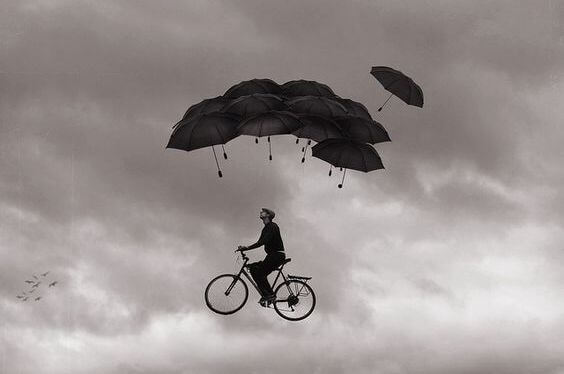The Dunning-Kruger Effect: Fictitious Inferiority and Superiority

The Dunning-Kruger effect is a distortion of thought that could be synthesized as follows: foolish people believe themselves to be more intelligent than they are and intelligent people think they are more foolish. Or perhaps it would be more accurate to say: ignorant people are sure that they know a lot and those who know a lot, feel ignorant.
This curious effect was discovered by David Dunning and Justin Kruger, two North American researchers from Cornell University. The first was a professor of psychology who one day came across news that left him perplexed. It was the case of a robbery committed by a 44-year-old man named McArthur Wheeler. The news said that he had held up two banks, without a mask and in broad daylight. He was captured in just a couple of hours.
“The first step of ignorance is presuming to know”
-Baltasar Gracián-
What caught Dunning’s attention was the thief’s explanation of his method of theft. He indicated that he had not worn a mask, but that he did apply lemon juice to his face. He hoped this would make him invisible to security cameras.
Why did he think such nonsense? Some friends of his had “taught” him the trick and he had verified it: he had applied lemon juice and then he had taken a picture. He could see that his face did not come out. Of course, the same lemon had prevented him from seeing that he had not focused on his face, but rather the ceiling. “How can anyone be so stupid?” David Dunning asked himself.
The Dunning-Kruger experiment
After long discussions about the thief’s behavior, Dunning posed a question that would serve as a hypothesis for further investigation: Could it be that an incompetent person is not aware of his own incompetence, precisely because of that? The question sounded like a tongue twister, but it certainly made sense.

It was then that he proposed that his best student, young Justin Kruger, do a formal investigation into the matter. This is how they organized a group of volunteers to do an experiment. Each of the participants was asked how efficient they considered themselves to be in three areas: grammar, logical reasoning and humor. They were then tested to assess their real competence in each of these areas.
The results of the experiment confirmed what Dunning and Kruger already suspected. In fact, the subjects who had been defined as “very competent” in each area, obtained the lowest scores in the tests. And, on the contrary, those who had initially underestimated themselves, achieved the best results on the tests.
At present it is very common to see people who speak with apparent authority on subjects they know very superficially. At the same time, usually the real experts are not so categorical in their statements, since they are aware of how vast knowledge is and how difficult it is to assert something with total certainty.
The analysis of the Dunning-Kruger Effect
The organizers of this study not only noticed that there was this cognitive bias, but also realized that the most incompetent people tended to underestimate the most competent. Therefore, they were much safer and had a much greater sense of sufficiency, despite their ignorance. Or, perhaps, precisely because of it.

After the experiment was carried out, the researchers reached the four conclusions that make up the Dunning-Kruger effect:
- People are unable to recognize their own incompetence.
- They tend not to recognize the competence of other people.
- They are not able to become aware of the extent to which they are incompetent in a given area.
- If they are trained to increase their competence, they will be able to recognize and accept their previous incompetence.
Once the effect of distortion in these people had been established, the question of why this phenomenon occurred was still to be answered. Dunning and Kruger stated that cognitive bias arose because the skills required to do something right are the same as those required to evaluate performance. Put another way: how do you realize that something is wrong, if you do not even know how to do that thing right?

People with high performance also had cognitive bias. In this case, the researchers established that what was produced was an error of perception known as “false consensus”. Such an error consists in people tending to overestimate the degree of agreement with others.
Surely you have expereinced the scene in which two people get involved in an argument and to resolve it, they finally decide to go to a third person outside of the dispute. The two parties consider this person neutral a priori to resolve the argument. Here, the false consensus would act when the two parties are convinced that the impartial observer is going to be like them.
Something similar happens with people who have a high performance in an activity. For them it is so easy to do it that they see no reason to suspect that most people cannot do it as well as them.
8 Types of Intelligences
Below we show you the multiple intelligences of Gardner. According to this, there are 8 types of intelligence. Do you want to know more about them? See more
This text is provided for informational purposes only and does not replace consultation with a professional. If in doubt, consult your specialist.








